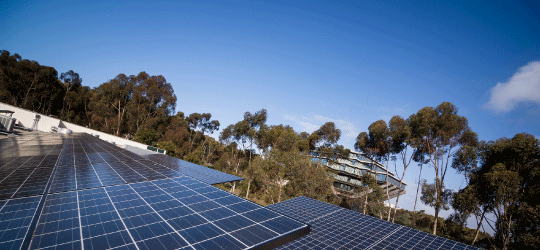Climate Action
University of California Commitment
In recognition of the need for a coordinated response to the climate crisis, the University of California updated its Sustainable Practices Policy in July 2023 with stronger climate action goals that prioritize direct emission reductions, limit the use of carbon offsets, and align UC’s climate goals with State goals. To support these goals, UC San Diego conducted a decarbonization study, funded by the State of California, to outline the feasibility of different strategies emissions reductions.
UC Policy Goals
- Total Emissions: Reduce total emissions (scope 1, 2, and 3) at least 90% by 2045 without relying on carbon offsets
- Scope 1 Emissions: Informed by the decarbonization study, each UC location will set reduction targets for 2030, 2035, and 2040
- Scope 2 Emissions: Purchase 100% clean electricity beginning in 2025
- Scope 3 Emissions: Set scope 3 emissions reduction targets for business travel, commuting, and solid waste disposal in alignment with the State of California’s goals
- Implementation Plan: Each UC location will prepare an updated climate action plan
In Development: Sustainability & Climate Action Plan
What is the Sustainability & Climate Action Plan (S-CAP)?
The forthcoming Sustainability & Climate Action Plan (S-CAP) builds off the decarbonization study to serve as a living framework to guide UC San Diego's pathway to decarbonization, strengthen climate resilience and drive measurable progress toward sustainability goals.
Sustainability & Climate Action Plan Survey: What Matters Most to You?
This short, anonymous survey invites the campus community to share which climate and sustainability actions matter most as the university plans for decarbonization, climate resilience and sustainable progress. Please complete the survey by Saturday, February 28 to be entered into a drawing for Birch Aquarium tickets.
How is the plan being developed?
The S‑CAP is being developed through an inclusive, iterative process led by Utilities and Sustainability, guided by a cross‑campus focus group of subject matter experts who recommend goals, actions and an implementation framework aligned with broader campus strategic plans. Input from engagement opportunities, including Climate Conversations and Meet with a Climate Action Fellow, will ensure that the plan reflects perspectives from students, staff, and faculty across UC San Diego.
Why develop a combined Sustainability & Climate Action Plan?
UC San Diego is developing a combined Sustainability & Climate Action Plan to reflect that effective climate action depends on the broader systems shaping campus operations and culture. Bringing decarbonization, resilience, resource management and community engagement into one framework strengthens alignment, accountability and collaboration across academic, operational and student partners. This integrated approach enables coordinated decisions and a unified narrative as the campus advances an inclusive, resilient, sustainability‑driven future.
When will the plan be completed?
Utilities and Sustainability will share a draft of the plan with the campus community for review and feedback this spring with final completion this summer.
How can I be involved in plan development?
- Join Climate Conversations: Participate in the monthly, in-person dialogue series held during the academic year. These sessions create space for ongoing, campuswide discussion as the plan takes shape.
- Meet with a Climate Action Fellow: Schedule time to meet with a student Climate Action Fellow from Utilities and Sustainability. This is a great way for student groups, organizations, and individuals to share ideas, ask questions, and contribute directly to the planning process.
- Stay Informed: Sign-up for the monthly Utilities and Sustainability newsletter to receive regular updates and learn about engagement opportunities as the plan evolves.
Decarbonization Study
The study is part of our continuous efforts towards decarbonization and will continue to evolve with ongoing engagement from our community, incorporation of new technologies, and the availability of green energy in the market. In pursuit of decarbonization goals, the primary focus of the study provides a detailed analysis associated with reducing Scope 1 emission from energy systems with the transitions away from fossil fuels. The study emphasizes the importance of a flexible, resilient, reliable, and secure energy distribution system to support continuous campus operations. Additionally, the study explores opportunities to leverage the campus as a living laboratory and identifies strategies for integrating equity, diversity, and justice into decarbonization efforts.
View the Decarbonization Study (English):
- Executive Summary – UC San Diego Decarbonization Study (1 page PDF)
- Full Report – UC San Diego Decarbonization Study (625 pages PDF)
- Study Supplement – Just Transition and Equity Considerations (87 pages PDF)
Vea el Estudio de Descarbonización (Español):
- Resumen Ejecutivo – Estudio de Descarbonización de la Universidad de California, San Diego (1 página PDF)
- Suplemento del Estudio – Consideraciones de Transición Justa y Equidad (87 páginas PDF)
Questions?
Contact sustain@ucsd.edu.
